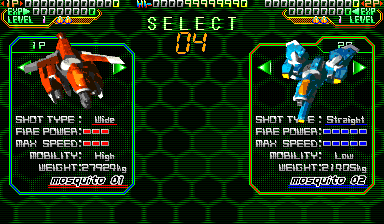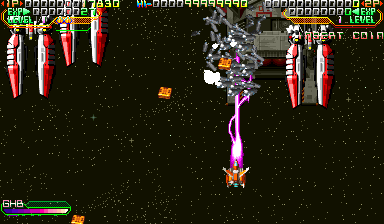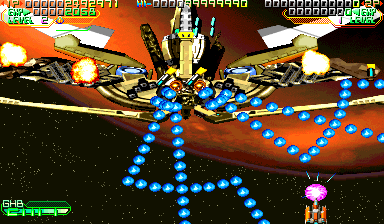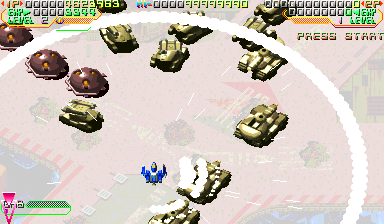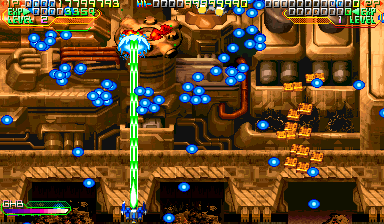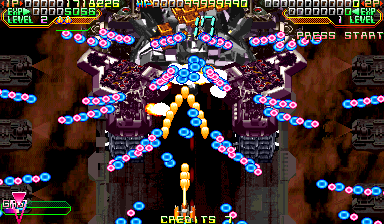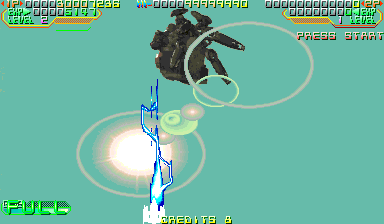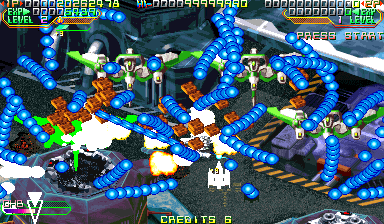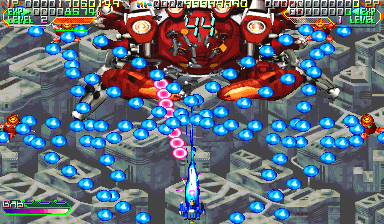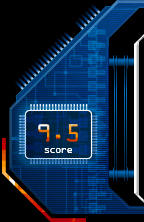HISTORY
OF THE MARS REVOLUTION
Mars
Matrix, like many other sci-fi shmups, is set on Mars (Ta-Dah! Surprised?).
The basic idea is this: after centuries of peaceful colonization
(a necessity,since Earth was overpopulated), something goes bad
and Mars government officially declares its indipendence...but there's
a suspect that some other entity, related to the "infinity
technology" (probably an alien artifact found decades before
the setting of the game), is using the planetary network system
for its own purposes. At any case, Earth sends an interplanetary
force to take down this coup d'etàt, and they decide to test
on the field the new warships...The Mosquitoes.
Mars
Matrix is the second shmup of the Takumi/Capcom trilogy, together
with Giga Wing and Giga Wing 2.While Takumi is one of the companies
that rose from Toaplan's ashes, designers Choco and Sh@rp (their
real names escape me know) were hired to create the game's "world"
and mechas: their most famous work is Xenogears,to my knowledge.
The game was originally a Capcom CPS-2 game, and it was ported on
Dreamcast with a lot of extras and some changes. I will write specific
notes on the differences between arcade and Dreamcast in the proper
sub-sections, while i'll list and review the extras here.
Extra
features
The
Dreamcast port has a lot of nice extra features. Before you can
trigger them, though, you need to play and accumulate points: These
points will count as money, money that you will use to buy the extra
features.The most important ones are the replay videos and the score
attack mode.The replay videos are not the best you can find on the
game, but they're pretty useful in seeing how to play the game and
have a good idea on the system. The score attack, on the other side,
grants you the possibility to practice the single stages, which
is very useful in order to learn patterns. You also have a lot of
nifty extras like an image gallery, different colours for pictures
and backgrounds, other interesting stuff like the ability to change
your Mosquito's speed and various other things.Not only that, you
get an entire extra mode, i.e. the same backgrounds but different
enemy sequence and thus a sort of unofficial sequel. Not bad, i'd
add!
Let's
then proceed to the main review,then!
GFX:
8++
Ok,
i just have written that design was cured by Choco and Sh@rp, of
Xenogears fame...but i have to admit that they didn't worked at
their best.I'd add that must have designed the vehicles only...
the game has nice settings, the way Mars has been drawn is interesting,
but the quality of drawings isn't costant.Let me explain better:
the backgrounds are sometimes nice (stage 2, stage 3 to some extent,
the satellite part of stage 1), but sometimes they're a bit generic
(stage 4 and 5).This is not really a big issue, though, since they're
still well done. A complain can be done on vehicles, tough: it's
obvious that Matsumoto (Leiji, the guy behind Captain Harlock and
Galaxy Express 999 ) was the main source of inspiration behind most
of the vehicles on the game, but sometimes generic drones and ships
are just...generic. Our ships (the "Mosquitoes") are well
drawn and animated, like some other enemies ( bizarre, but mostly
mid-bosses or carriers/big enemies) and bosses. It must also be
noted that all enemies are pre-rendered, and this may turn off a
few people who dislike such kind of graphics. Other graphical aspects
are very well done, instead: for example, The "score report"
screens you get between stages are also very good, and you even
have short 3D movies shown in one angle of the screen, to simulate
the pilot's cockpit that receive informations on the next mission.
Bosses, as i said, are also well animated, especially the third
stage one (a giant red scarab): except for first and second baddies,
they also are pretty interesting in design. The Dcast version also
features a nice intro movie, which is excellent and exploits the
Dcast's 3D abilities very well. It has to be said that the Dcast
version doesn't look exactly like the arcade version, thanks to
Capcom making a small mess with resolution (to my knowledge, this
is common to all of their 2D ports to Dcast). This doesn't affect
gameplay, so it's a minor nuisance (unless you're a silly graphics-junkie).
SUMMARY
OF SUBSECTION
Graphics
are well done, vehicles are pre-rendered though, and this may turn
off some people.Backgrounds and minor vehicles tend to be a bit
bland, but big enemies and bosses are well done. Extra features
like the intro movie are also excellent, and the overall aspect
is good.
BGM:
9.5
The
original arcade soundtrack was pretty good, but the author (Yasushi
Kaminishi) decided to remix it for the Dreamcast port.This has been
a good idea, since the original arcade songs were all a bit too
short and simple, or better: they were 1-minute loops repeated a
couple of times, to match with the stages' length. The Dreamcast
version has instead more elaborate tunes, which are actually longer
than the stages they're associated to (but this is something you
will discover by listening to the soundtrack, of course). Once said
that, a few notes on the OST itself. Basically, it's your "usual"
techno/trance BGM, but it's very very good and, like many other
shmups soundtracks, it is better than many "club" music
you may listen to. The BGM can be easily divided in more fast, techno-ish
tracks like "Armed Satellite Phobos", "Descending
to Mars" and "True Darkness pt.2" (stage 1, 2 and
fifth boss), whereas other are more slow and trance/ambient-like,
for example "Forbidden fruit" "Surprise attack"
and "True darkness pt.1" (stage 6, 3 and 5). Both styles
contribute well in creating an atmosphere of fast action and impeding
doom, perfect for the game and its style. Another excellent song
is "Mosquito", which is the tune that accompanies the
introductive movie: it really gives a nice "extra-terrestrial"
atmosphere, with its trance grooves and the short bits of communication
between the Mosquitoes and the main fleet!
SUMMARY
OF SUBSECTION
Excellent
Dance/techno BGM, albeit the original arcade soundtrack was less
polished and elaborate.It completements flawlessly the alien atmosphere
and has a few memorable tunes,which could easily work wonders in
clubs and discoteques.
GAMEPLAY:
10
For
an in-depth analysis of the game you can check
the ST i wrote. In short: the game is built around one simple
mechanic, the mosquito system. You can absorb bullets and "spit"
them back at the enemies, and this will grant you two things: the
ability to destroy the baddies with their own fire-power and a lot
of experience cubes.Instead of power-ups, you get an experience
level system that works in this way...
All
aerial enemies, once destroyed, will release said experience cubes,
whose value varies with size (+1,+5,+10,+50). Reflected bullets
are transformed to +1 cubes, too. Once you get a cube, you will
start a chain: in the upper left corner of the screen, below the
score and the experience points score, you have a bar : as long
as it has some energy in, it means that every cube you take will
increase in value and extend the chain's duration. An example: if
you take a +1 cube, your bar will start flashing (and will go down
and expire after one second). If you take another cube, you will
get the timer back to one second, the cube itself will be worth
2 exp points (the value increases progressively) and add 2 points
to your experience total. This means that if you take 7 cubes worth
+1 without breaking the chain, you will get 1+2+...+7=28 experience
points. If you take a +5 cube after that, the next cube will be
worth +12 points, and you will get 28+5=33 points. If instead you
get all +1 cubes, going from +7 to +11 in value, you will get 28+7+8+9+10+11=73
experience points. This means that the most rewarding chains are
the ones where you take a lot of small +1 cubes and get to high
values (like +1,7k). The advantage of getting bigger exp. cubes
is that they give you more time to chain, though.For instance, the
+5 cubes will give you 2 seconds, whereas the few +50 cubes around
will give you 5 seconds (the chain bar will be completely full!).
This
will help you in getting power-ups for your main gun: you basically
power-up (and morph the ship) up to level 8 (please read the ST
for the correct values), and get one extra life at level 4.Also,
the experience points value will act as a multiplier for your score,
so you can end racking up billions of points!
Now,
once you know how the experience system works, let's explain the
attacks.
You
have four attacks at your disposal:
1) Normal shot (tap button);
2) Pierce cannon (don't shoot and it will automatically charge);
3) Mosquito reflection (hold down button);
4) Gravity Hole Bomb (hold down button until the energy in bar in
the lower right corner gets depleted);
The
latter two can be thought as "defensive systems", at the
beginning. However, considering how many bullets the enemies will
throw at you, you will soon learn to think of them as your best
offensive devices.Their mechanic is simple: hold down the main button
and a gravitational field will be triggered, consuming energy in
the meanwhile (the bar is in the lower right corner). Once you release
the button, the bullets will be released and go in a straight line,
which is the normal line to the field in that point: this basically
means that they will go in the reverse direction of your movement.
If you completely deplete your mosquito energy, you will release
a gravity hole bomb (or just a bomb, in short), which will damage
everything in a given radius (which is half of the screen's height).
The mosquito energy will obviously be replenished when you don't
use it.
SUMMARY
OF SUBSECTION
The
gameplay focuses on reflecting bullets with the Mosquito system,
creating experience cubes that, if chained, will grant you a lot
of experience points, necessary to power-up your ship and increase
your score.It's a bit difficult to grasp at first, but once done,
it rewards the player with an extremely ductile system.
LONGEVITY:
9.5
Mars
Matrix is one of those games that has a virtually limitless replay
value. This derives from the game itself and from the extra features
offered on the Dreamcast port. One thing you will notice, if you
get proficient at the game, is the sheer brilliance of stage design.
All stages can be chained in more than just one way, especially
if you master the Mosquito system..Unlike other games based on chaining,
Mars Matrix allows you a good degree of "improvisation",
since you can create cubes at will and thus keep your chain going
in more than just one way (once you master the system, of course!).
Not only that, but you also have two ships, which play in a pretty
different way, and this means that you can have two styles of improvisation,
even if you will probably only like one.If you're tired of the normal
game, you can also play the arrange mode, which also features an
excellent design and gives room for creativity as much as the original
version.Not only that, but you can also play the score attack mode,
which feature a special mode which will give you a shower of experience
cubes every time you pierce an enemy!
SUMMARY
OF SUBSECTION
The
game has a lot of replay value, since you can approach stages with
more than one method to get long chains.It also features an extra
"arrange mode" and interesting score attack modes.
SCORE:
9.5






